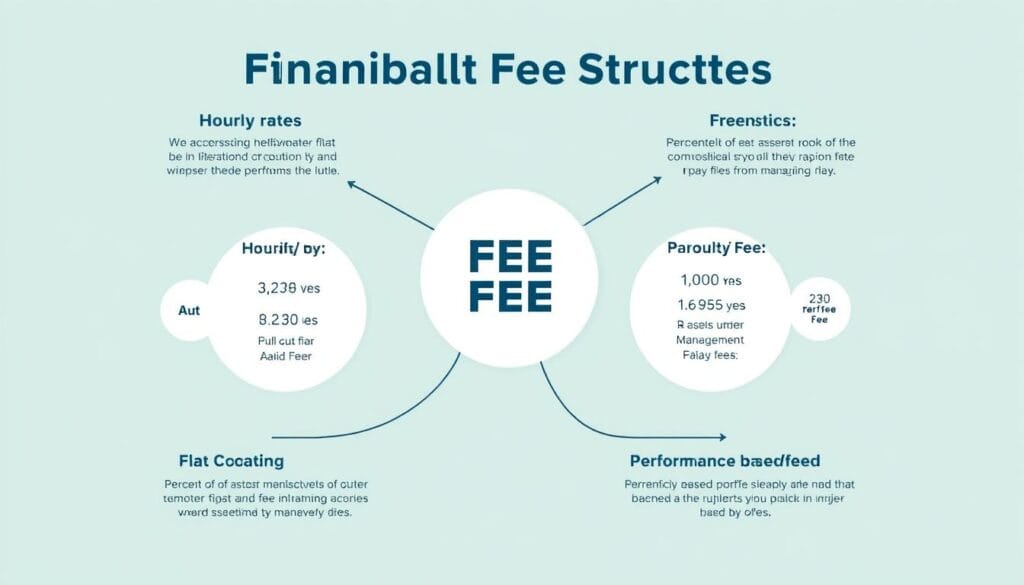Did you know that a significant 73% of Americans rely on professional financial guidance to achieve their long-term financial goals? Selecting the right financial advisor can be a game-changer for your financial future, providing personalized advice tailored to your unique needs and local economic conditions.
Finding a trustworthy advisor who understands your financial situation and goals is crucial. With numerous financial professionals available, the process can be overwhelming. This guide will walk you through the essential steps to choose an advisor who aligns with your financial objectives and personal values, ensuring a long-term relationship that fosters wealth growth.
For those new to investing, exploring options like robo-advisors can be a great starting point. Understanding your financial needs, evaluating credentials, and identifying the right fee structure are critical components of making an informed decision.
Key Takeaways
- Understand your financial needs and goals before selecting an advisor.
- Research different types of financial advisors and their services.
- Evaluate the qualifications, credentials, and experience of potential advisors.
- Consider the fee structure and how it aligns with your financial situation.
- Identify red flags and ensure the advisor is a fiduciary.
Understanding Your Financial Advisory Needs

The first step in selecting a financial advisor is to have a clear understanding of your current financial situation and future goals. This foundational step is crucial in determining the type of financial advisor that would be most beneficial for you.
Assessing Your Current Financial Situation
Assessing your current financial situation involves taking stock of your assets, liabilities, income, and expenses. This comprehensive overview will help you understand your financial health and identify areas that require improvement. By doing so, you’ll be better equipped to find a financial advisor who can address your specific needs.
Identifying Your Financial Goals
Understanding your short-term and long-term financial goals is vital in determining the type of financial advisor you need. Common financial goals include retirement planning, education funding, wealth accumulation, debt management, tax optimization, and estate planning. By identifying your goals, you can narrow down your search to advisors who specialize in the areas that matter most to you.
Determining If You Need Professional Help
Not everyone needs a full-service financial advisor. Your financial complexity, available time, interest in managing finances, and knowledge level all factor into this decision. Individuals with complex financial situations, such as business owners or high-net-worth individuals, typically benefit most from professional financial planning. Assessing your comfort level with financial decision-making is also important.
| Financial Situation | Level of Complexity | Recommended Advisor Type |
|---|---|---|
| Simple | Low | Targeted Advice |
| Complex | High | Comprehensive Planning Services |
By understanding your financial advisory needs, you can narrow down your search to find an advisor in your city who offers the specific services you require. This tailored approach ensures that you receive the most relevant guidance for your financial situation and goals.
Types of Financial Advisors Available
Financial advisors come in various forms, each with unique qualifications and service offerings. Understanding these differences is crucial in selecting the right professional for your financial needs.

Investment Advisors
Investment advisors specialize in creating personalized investment plans based on market knowledge and client goals. They are registered with the Securities and Exchange Commission (SEC) and state securities regulators, ensuring compliance with regulatory requirements. Expertise in market conditions allows them to provide advice on trading specific securities, such as stocks and bonds.
Certified Financial Planners
Certified Financial Planners (CFPs) take a holistic approach to financial planning, addressing aspects such as retirement, investments, insurance, taxes, and estate planning. Their comprehensive plans are tailored to individual client needs, providing a broad range of financial services. A CFP’s expertise can be invaluable in creating a cohesive financial strategy.
Stockbrokers
Stockbrokers primarily execute securities transactions on behalf of their clients. Typically associated with brokerage firms, they serve both individual and institutional investors. Their role is crucial in facilitating the buying and selling of securities, such as stocks and bonds.
Robo-Advisors
Robo-advisors offer algorithm-based investment management at lower costs compared to traditional financial advisors. Some robo-advisors provide hybrid models that include limited human interaction, offering a balance between technology-driven investment strategies and personal guidance.
Understanding the differences between these types of financial advisors is key to matching your financial needs with the appropriate professional. Local investment advisors, in particular, can offer valuable insights into regional economic trends and investment opportunities specific to your city or state.
The Importance of Fiduciary Duty

As you navigate the process of choosing a financial advisor, it’s essential to grasp the significance of fiduciary duty in protecting your financial interests. The fiduciary standard of care is a rule that requires financial advisors to put their clients’ best interests ahead of their own, even if it means recommending strategies that could reduce their own compensation.
Fiduciary vs. Suitability Standards
The fiduciary standard differs significantly from the suitability standard, which only requires that recommendations be “suitable” for clients but not necessarily optimal. Many professionals use the title “financial advisor,” but only some are required to adhere to fiduciary standards – typically registered investment advisors (RIAs). When interviewing potential advisors in your city, directly asking “Are you a fiduciary?” is one of the most important questions you can pose.
Why Fiduciary Status Matters for Your Finances
Working with a fiduciary advisor provides an additional layer of protection against conflicts of interest and potentially harmful financial recommendations. For more information on how to make the most of your financial planning, you can explore resources like planning your retirement with AI-powered financial. Fiduciary advisors are more likely to recommend low-cost investment options and transparent fee structures that benefit clients rather than generating higher commissions.
Understanding How Financial Advisors Get Paid

The way financial advisors get paid can significantly impact the advice they provide. Understanding their compensation structures is crucial for making informed decisions about your financial future.
Fee-Only Advisors
Fee-only advisors charge directly for their services, using methods such as hourly rates ($100-$500/hour), flat fees, or a percentage of assets under management (typically 0.5%-1.5% annually). This model is often considered transparent and aligned with the client’s best interests.
Commission-Based Advisors
Commission-based advisors earn money through commissions on financial products they sell. While this model can create potential conflicts of interest, some advisors manage these conflicts by being transparent about their compensation.
Fee-Based Advisors
Fee-based advisors use a hybrid model, charging direct fees for some services while earning commissions on certain products. This combination of fee-only and commission-based structures offers flexibility but requires careful consideration of potential conflicts.
Comparing Cost Structures
When comparing financial advisors, consider both direct fees and indirect costs associated with recommended investment products. For many investors, fee-only advisors provide the most transparent compensation structure. Always ask potential advisors to clearly explain their fees and how they’re calculated before establishing a professional relationship. For more information on managing your investments, visit our guide on best mutual funds for retirement.
Understanding an advisor’s compensation structure helps identify potential conflicts of interest and determine the true cost of financial advice. Local fee structures may vary based on your city’s cost of living and competitive landscape among financial advisors.
Essential Credentials to Look For

A financial advisor’s credentials can reveal a lot about their capabilities and commitment to their profession. When evaluating a potential advisor, it’s essential to look for recognized professional designations that signify a certain level of expertise and adherence to industry standards.
Certified Financial Planner (CFP)
The Certified Financial Planner (CFP) designation is widely regarded as the gold standard for financial planning professionals. To achieve this designation, candidates must undergo extensive education, pass a comprehensive exam, and adhere to ethical standards. CFP professionals are also required to complete continuing education requirements and follow a fiduciary standard of care with their clients.
Chartered Financial Analyst (CFA)
The Chartered Financial Analyst (CFA) designation focuses on investment analysis and portfolio management. Candidates must pass three rigorous exams and accumulate relevant professional experience to earn this credential. The CFA designation is highly respected in the investment community and indicates a deep understanding of financial markets and investment strategies.
Other Important Designations
Besides CFP and CFA, other valuable credentials include Chartered Financial Consultant (ChFC), Certified Public Accountant/Personal Financial Specialist (CPA/PFS), and Retirement Income Certified Professional (RICP). When evaluating an advisor’s credentials, consider which designations align with your specific financial needs, whether it’s retirement planning, tax strategies, or investment management.
It’s also crucial to verify an advisor’s credentials through official certification boards, which maintain public databases of credential holders and any disciplinary actions. Be wary of advisors with obscure credentials that may be obtained with minimal effort or oversight, as these often serve more as marketing tools than indicators of expertise.
Steps for Choosing a Financial Advisor in Your City

To find a reliable financial advisor, you need to follow a systematic approach tailored to your local financial landscape. This process involves several key steps that help ensure you find the right professional for your financial needs.
Research Local Options
Start by researching local financial advisors through professional directories, industry associations, and local business networks specific to your city. This initial step helps you identify multiple potential candidates.
Check Regulatory Records
Utilize regulatory resources like FINRA’s BrokerCheck and the SEC’s Investment Adviser Public Disclosure (IAPD) website to verify credentials and check for any disciplinary actions against potential advisors.
Seek Recommendations
Seek recommendations from trusted sources including friends, family members, colleagues, and other financial professionals like accountants or attorneys who work with financial advisors. Personal referrals can provide valuable insights into an advisor’s professionalism and service quality.
Use Online Resources and Databases
Online resources such as the National Association of Personal Financial Advisors (NAPFA), the Financial Planning Association (FPA), and the CFP Board’s directory can help identify qualified advisors in your area. These databases allow you to filter advisors based on their specialties and services, making it easier to find someone who meets your needs.
For more information on financial planning tools that can complement your advisor’s services, you can visit this resource on AI financial planning tools.
| Resource | Description | Usefulness |
|---|---|---|
| FINRA’s BrokerCheck | Verify credentials and check disciplinary actions | High |
| NAPFA | Directory of fee-only financial advisors | High |
| CFP Board’s Directory | Find Certified Financial Planners | High |
By following these steps, you can systematically evaluate potential financial advisors and make an informed decision that aligns with your financial goals and needs.
Questions to Ask Potential Financial Advisors

Evaluating potential financial advisors requires asking thoughtful questions that help you understand their experience, services, and fees. This process enables you to make an informed decision and choose an advisor who aligns with your financial goals and needs.
Questions About Experience and Expertise
When assessing a financial advisor’s experience, ask about their professional background, typical clients, and areas of specialization. It’s essential to understand their expertise in handling financial situations similar to yours. You can also inquire about their certifications, such as Certified Financial Planner (CFP) or Chartered Financial Analyst (CFA), which indicate a level of expertise and commitment to ethical standards.
Questions About Services and Investment Philosophy
Understanding a financial advisor’s approach to financial planning, investment strategy, and risk management is crucial. Ask about their investment philosophy and how they measure success for their clients. You may also want to know if they offer a comprehensive financial planning service or focus on specific areas like investment management or retirement planning.
| Service | Description | Typical Cost |
|---|---|---|
| Investment Management | Professional management of investments to achieve financial goals. | 0.5% – 2% of assets |
| Retirement Planning | Creating a plan to achieve retirement goals. | $1,000 – $3,000 |
| Financial Planning | Comprehensive planning for overall financial health. | $2,000 – $5,000 |
Questions About Fees and Compensation
Clarify how the financial advisor is compensated, including all direct and indirect costs. Ask if they receive any third-party compensation for product recommendations, which could influence their advice. Understanding their fee structure will help you assess the total cost of their services.
Questions About Communication and Accessibility
Establishing clear expectations about communication is vital. Ask about their meeting frequency, accessibility between scheduled meetings, and preferred communication methods. You should also inquire about who you’ll be working with directly and their process for staying current with changes in tax laws and financial planning strategies.
By asking these questions, you can comprehensively evaluate potential financial advisors and make an informed decision that aligns with your financial goals and needs.
Evaluating Advisors Based on Your Specific Needs

Matching your financial needs with the right advisor’s expertise is vital for effective financial planning. Different financial advisors specialize in various aspects of financial planning, making it essential to align their expertise with your specific financial priorities and life stage.
Retirement Planning Specialists
Retirement planning specialists focus on creating sustainable income strategies, optimizing Social Security benefits, and ensuring your assets last throughout retirement. When evaluating these specialists, consider your retirement goals and whether they have experience helping clients with similar objectives. Look for advisors who can provide comprehensive retirement plans tailored to your needs.
Investment Management Experts
Investment management experts concentrate on portfolio construction, asset allocation, risk management, and investment selection based on your financial goals and risk tolerance. It’s crucial to assess their investment philosophy and ensure it aligns with your expectations. Check if they have a track record of managing investments for clients with similar profiles.
Estate Planning and Tax Advisors
Estate planning and tax advisors help with wealth transfer strategies, minimizing estate taxes, creating trusts, and coordinating with estate attorneys to implement comprehensive plans. When evaluating these advisors, consider your estate planning needs and whether they have experience with tax-efficient strategies. Look for professionals who can provide guidance on both estate planning and tax implications.
| Advisor Type | Specialization | Key Services |
|---|---|---|
| Retirement Planning Specialists | Retirement Planning | Sustainable income strategies, Social Security optimization |
| Investment Management Experts | Investment Management | Portfolio construction, asset allocation, risk management |
| Estate Planning and Tax Advisors | Estate Planning and Tax | Wealth transfer strategies, estate tax minimization, trust creation |
When evaluating financial advisors, consider whether you need a specialist in a particular area or a generalist who can coordinate various aspects of your financial life. Local advisors may have specialized knowledge about city-specific considerations such as local tax issues, real estate markets, or business environments that could benefit your financial planning.
Red Flags to Watch Out For
To protect your financial well-being, it’s essential to recognize warning signs when evaluating potential financial advisors. Being aware of these indicators can help you avoid advisors who may not act in your best interest or provide subpar service.
Pushy Sales Tactics
Be cautious of financial advisors who use pushy sales tactics, such as pressuring you to make immediate decisions or invest in proprietary products. This behavior often indicates that the advisor is prioritizing commissions over your needs. A reputable advisor will give you time to consider your options and make informed decisions.
Lack of Transparency
A financial advisor who lacks transparency about their fees, compensation structure, or potential conflicts of interest is a red flag. Transparency is crucial in building trust and ensuring you’re making informed decisions about your money and investments. Make sure your advisor is forthcoming about all aspects of your financial relationship.
Unrealistic Promises
Be wary of advisors making unrealistic promises about investment returns or guarantees that seem too good to be true. No reputable advisor can promise specific market performance. Such promises are often indicative of a lack of understanding of the market or an attempt to lure you into a potentially risky investment.
| Red Flag | Description |
|---|---|
| Pushy Sales Tactics | Pressure to make immediate investment decisions |
| Lack of Transparency | Unclear about fees, compensation, or conflicts of interest |
| Unrealistic Promises | Guaranteeing specific investment returns or market performance |
As Warren Buffett once said, “Price is what you pay. Value is what you get.” A trustworthy advisor will help you understand the value behind your investments, not just the price. When selecting a financial advisor, make sure to watch out for these red flags and trust your instincts to make the best decision for your financial future.
Meeting with Potential Advisors
Initial consultations with financial advisors provide a valuable opportunity to gauge their expertise and determine if they’re the right financial advisor for you.
Preparing for Initial Consultations
Before meeting with potential advisors, it’s crucial to prepare by organizing your financial information, clarifying your financial goals, and developing a list of specific questions tailored to your situation.
- Organize your financial documents and information.
- Clearly define your financial goals and objectives.
- Prepare a list of questions to ask the advisor.
For more information on financial planning tools that can help you organize your finances, visit top financial planning software for 2025.
Evaluating Personal Compatibility
Personal compatibility with your financial advisor is crucial for a successful long-term relationship. You should feel comfortable discussing sensitive financial matters and confident in their guidance.
| Compatibility Factors | Description | Importance Level |
|---|---|---|
| Communication Style | How well the advisor listens and explains concepts. | High |
| Investment Philosophy | Alignment with your financial goals and risk tolerance. | High |
| Frequency of Updates | How often the advisor communicates with clients. | Medium |
Evaluating these factors during your initial consultations will help you find an advisor who is not only qualified but also a good personal fit for your financial planning needs.
Conclusion
Finding the ideal financial advisor in your area requires careful consideration and research. The right financial advisor can provide invaluable guidance on investments, retirement, and estate planning. By choosing a qualified advisor who meets your specific needs, you can gain confidence in your financial decisions and create a more secure future.

